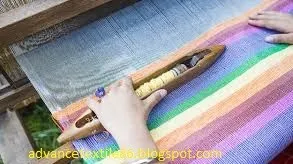Introduction
For
fabric production, the weaving process is a very important part of the textile.
We cannot get woven cloth without weaving. In garments, we get a large portion
of the fabric from the weaving process.
The weaving process in textile
Weaving
is a process of textile production in which two sets of two yarns or threads
are set. Other methods laced at right angles to make a fabric or cloth are
knittings, crocheting, felting, breaking, or plying. Longitudinal threads
are called the warp and lateral threads are the weft or filling. These threads
affect the properties of the fabric in the inter-woven method. The fabric is
usually woven into a loom, a device that holds the warp threads in place while
filling the threads. A fabric band that meets this definition of fabric can
also be made using other methods, including tablet weaving, backstrap weaving,
or other techniques without weaving. The way the warp and the filling thread
come together is called weaving. Most of the woven products are made in one of
three basic looms: plain wave, satin weave, or towel. The knitted fabric can be
simple (in one color or in a simple pattern) or can be woven into a decorative
or artistic design.
 |
| Weaving process |
The
loom can be summarized as a repetition of three sequences, also called the initial motion of the loom.
A.
Shading: where warp threads (edges) can be separated by raising or lowering the
held frames (handles) to create a clean space where the pick can go.
B.
Pickup or picking: Where the loom or pick is hand operated across the loom, an
air-jet, a rapper, or a shuttle.
C.
Beat-up or beating: where the groove pushes the weft against the fall of the
cloth.
Conclusion
The
Lancashire loom was the first semi-automatic loom. Jacquard looms and dobby
looms have sophisticated fountain systems. These can be individual looms or plain looms. A Northrop loom was fully automated and was mass-produced in the
mid-1909s and 1960s. Modern looms run fast and do not use any shuttles: there
are air-jet looms, water-jet looms and rapier looms.









0 Comments